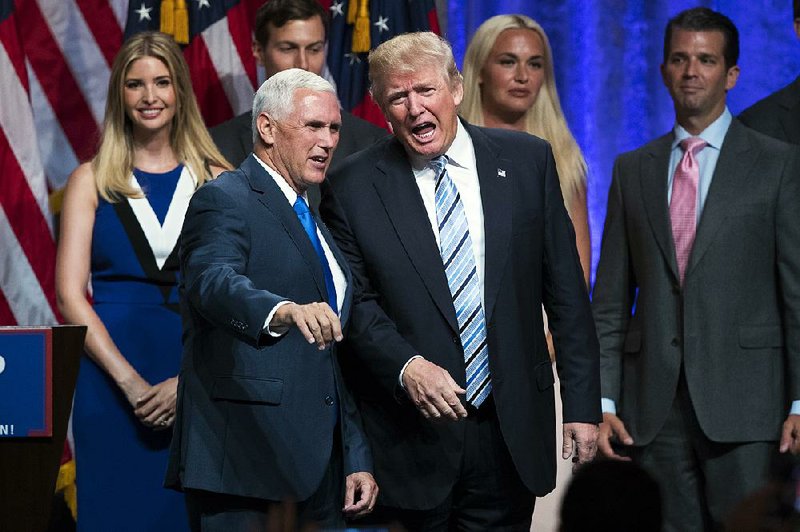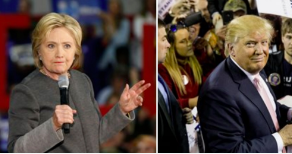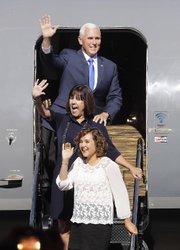NEW YORK -- Donald Trump introduced Indiana Gov. Mike Pence as his running mate Saturday, calling him "my partner in this campaign" and his first and best choice to join him on a winning Republican presidential ticket.
FULL ELECTION COVERAGE
The joint appearance was intended to catapult the party toward a successful and unified Republican National Convention, which kicks off in Cleveland on Monday.
Later Saturday, the campaign named six aides to help Pence's campaign efforts. Nick Ayers was appointed senior adviser. Campaign Chairman Paul Manafort welcomed the new members of the campaign staff and praised Pence as "a man of impeccable character."
Skipping the traditional large rally in favor of a low-key announcement in a Manhattan hotel, Trump tried to draw a sharp contrast between Pence, a soft-spoken conservative, and Hillary Clinton, the presumptive Democratic presidential candidate. He spent about as much time lambasting Clinton as praising Pence, declaring she had led President Barack Obama "down a horrible path" abroad.
Trump said Pence would stand up to America's enemies and that he and the governor represent "the law-and-order candidates" at home.
"What a difference between crooked Hillary Clinton and Mike Pence," Trump said. He added: "He's a solid, solid person."
Trump conceded that one of the reasons he'd selected Pence was to promote unity within the Republican Party, left fractured by Trump's ascent.
"So many people have said 'party unity,' because I'm an outsider," Trump said. "I want to be an outsider."
Most of Trump's focus Saturday morning was not on Pence. In addition to blasting Clinton, Trump reacted to the recent attack in Nice, France, and the failed coup in Turkey, touted his primary victories and called for religious leaders to be allowed to endorse presidential candidates.
The announcement also lacked much of the stagecraft typically associated with the public unveiling of a running mate, one of the most significant moments in a presidential campaign's control.
The two did not walk out together, appearing side by side only after Trump delivered a rambling 28-minute address that included a plug for his new hotel in Washington. And when they shook hands, with the political world watching, it was only for a few seconds before Trump left the podium.
Pence, standing alone in front of American flags, hewed closely to the populist themes that Trump has voiced on the campaign trail, describing himself as "really just a small-town boy." He praised Trump effusively as "a good man," a fighter, a legendary businessman and a patriotic American.
"The American people are tired," Pence said. "We're tired of being told that this is as good as it gets. We're tired of having politicians in both parties in Washington, D.C., telling us we'll get to those problems tomorrow."
Pence said he was called to serve, and seemed mindful of reassuring voters about Trump's character.
"Donald Trump is a good man, and he will make a great president of the United States," Pence said, adding, "I know what all of America will soon know -- these are good people."
Afterward, the Pence family and the Trump family walked onstage, except for Trump's wife, Melania, who was said to be at the couple's golf club in Bedminster, N.J., with their son, Barron, 10. The two men then worked a rope line with attendees.
Pence, whose calm demeanor forms a marked counterpoint to Trump, was chosen in part to ease concerns in some GOP corners about Trump's impulsive style and lack of political experience. A steady conservative with extensive governing experience, Pence also may serve to reassure Republicans who are skeptical about Trump's conservative credentials.
Brandishing his running mate's job-creating credentials, Trump ticked through a list of statistics he said showed how Pence had pulled Indiana out of economic recessions: an unemployment rate that fell to less than 5 percent on his watch, an uptick in the labor force and a decrease in Indiana residents on unemployment insurance.
"This is the primary reason I wanted Mike -- other than that he looks very good, other than he's got an incredible family, and incredible wife," Trump said. He predicted Pence would have won re-election as governor, were he not running for vice president.
The Trump-Pence event offered Americans the first glimpse at what the 2016 Republican presidential ticket will look like, barring the unexpected. Just as Trump was settling on Pence, Republicans gathering in Cleveland essentially quelled the movement to oust Trump at the convention, all but assuring he'll be the GOP nominee.
"They got crushed," Trump said. "And they got crushed immediately, because people want what we're saying to happen."
Pence is well-regarded by evangelical Christians, particularly after signing a law that critics said would allow businesses to deny service to gay people for religious reasons. But his ideology also is at odds with Trump, who has largely avoided wading into social issues.
In choosing Pence, Trump appeared to be looking past their policy differences.
The Indiana governor has been a longtime advocate of trade deals such as the North American Free Trade Agreement and the Trans-Pacific Partnership, both opposed by Trump. He's been critical of Trump's proposed temporary ban on foreign Muslims entering the U.S., calling the idea "offensive and unconstitutional." Pence also endorsed Sen. Ted Cruz of Texas instead of Trump ahead of Indiana's presidential primary.
But once Pence joined the ticket, he said he strongly backed Trump positions that he'd criticized in the past. On Fox News on Friday evening, Pence said he was "very supportive of Donald Trump's call to temporarily suspend immigration from countries where terrorist influence and impact represents a threat to the United States."
Also on Fox, Pence said he backed another signature proposal of the Trump campaign, vowing that a wall between Mexico and the U.S. would be built under their administration. He also said that Mexico would "absolutely" pay for it.
Pence spent 12 years in Congress and has occupied the Governor's Mansion in Indianapolis since January 2013.
Saturday's event was over by noon. Trump and Pence will not appear together again until later this week.
The underwhelming rollout continued when Pence got back to Indiana, where a few hundred people greeted him at a suburban Indianapolis airport hangar bereft of any "Trump-Pence" signs or other obvious trappings of a presidential campaign. He spoke for only a few minutes, telling the crowd that he and his family were headed home for "pizza night."
And that was exactly what Pence's fans at home in Indiana expected.
"Even though the Trump rallies are big productions ... for Mike Pence, this is his style: a little more understated, a little more traditional, a little more what you'd expect from a conservative," said Dana Carroll of suburban Indianapolis.
Rival camp sees waffling
Clinton's team, meanwhile, was already painting Pence's conservative social viewpoints as out of step with the mainstream. Her campaign also seized on Trump's process for selecting and announcing his pick, painting Trump in a Web video released Saturday as "Always divisive. Not so decisive."
After days of Trump's aides saying he hadn't made a final decision, the businessman called Pence on Thursday afternoon to offer him the job, but hours later postponed their first appearance after a truck attack killed 84 people in Nice, France.
Trump had spent weeks vetting vice presidential contenders, including former House Speaker Newt Gingrich and New Jersey Gov. Chris Christie, and only zeroed in on Pence in recent days. Pence, meanwhile, had faced a Friday deadline to withdraw from his re-election race for governor so he could run for vice president; his aides filed the paperwork about an hour before the cutoff.
Also Saturday, a Clinton campaign aide said the former secretary of state plans to, if elected, introduce a constitutional amendment to overhaul the campaign-finance system during her first 30 days in the White House.
The amendment would target the Supreme Court's 2010 Citizens United decision with the goal of diminishing the political influence of the wealthy, while giving average voters more control over the political process. Clinton was to discuss the amendment during a video address Saturday to the progressive activist group Netroots Nation.
Moving ahead with an amendment at the start of her term is a shift from the plans Clinton outlined in the past, which would begin with attempting to effect change through the high court and only turning to the Constitution if the court doesn't act.
The ratification of a constitutional amendment requires the support of two-thirds of both chambers of Congress and three-quarters of all states. The attempt likely would move in tandem with new Supreme Court appointments and legal challenges to the Citizens United ruling.
Many activists on the left have been skeptical about how Clinton would approach campaign-finance issues given her campaign's reliance on deep-pocketed donors and her implicit endorsement of the Priorities USA Action super political action committee. Clinton, like Obama during his 2012 re-election, has made clear that she's unwilling to "unilaterally disarm" against Republicans on fundraising and has instead stressed the desire for a campaign fight on more equal footing followed by policy changes once elected.
Information for this article was contributed by Brian Slodysko, Julie Pace, Julie Bykowicz, Ken Thomas, Alan Fram, Josh Lederman, Steve Peoples, Jill Colvin and Jonathan Lemire of The Associated Press; by Maggie Haberman of The New York Times; by Jenna Johnson of The Washington Post; and by Jennifer Jacobs, Jennifer Epstein and Michael C. Bender of Bloomberg News.
A Section on 07/17/2016


